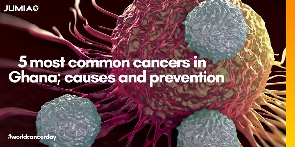CANCER! As scary as the word sounds, means a lot of different things.
However, the most common among all these is the disease. This is caused by an uncontrolled division of abnormal cells in a part of the body. There are many types of cancers that attack the human body and almost all of them are fatal.
Some take time to take adverse effects while others are just not time friendly.
The GLOBOCAN estimates that 16,600 cases of cancer occur annually in Ghana, yielding an age-standardized rate of 109.5 cases per 100,000 persons. Each year, the world celebrates "World Cancer Day" in the month of February to create awareness about the various types, symptoms, and prevention of cancer.
Often, cancer patients need extra care and attention to help them go through relatively tough periods of rehabilitation and recovery. This year, World Cancer Day is slated for Saturday, 4th February 2023 under the theme: "Close the care gap".
Jumia, Africa’s leading e-commerce company discusses the importance of cancer awareness by highlighting the most common cancers in Ghana as well as their causes and possible ways of prevention below:
Breast Cancer - Maybe the most talked about or most popular cancer worldwide. According to the 2020 GLOBOCAN report, Ghana is estimated to record 4,645 (20.4%) new breast cancer cases which are more than double the estimated 2,062 new cases in 2012, with close to 50% of them dying;
the high mortality rate is mainly due to late-stage presentation. Most of the women affected with breast cancer are below the age of 50 in Ghana (58.2%). Breast cancer happens when cells in your breast grow and divide in an uncontrolled way, creating a mass of tissue called a tumor.
Signs of breast cancer can include feeling a lump in your breast, experiencing a change in the size of your breast, and seeing changes to the skin on your breasts. Mammograms, self-checks, and regular checks by health professionals can help with early detection. Early detection helps breast cancer patients to live long fulfilling lives while late-stage detection can be fatal.
Lung Cancer - According to the WHO data published in 2020 Lung Cancers Deaths in Ghana reached 237 or 0.14% of total deaths. This is alarming considering the major cause of lung cancer is smoking of cigarettes.
Lung cancer also can be caused by using other types of tobacco (such as pipes or cigars), breathing secondhand smoke, being exposed to substances such as asbestos or radon at home or work, and having a family history of lung cancer.
The best way to prevent lung cancer is to avoid smoking of any form whether primary or secondary. Lung cancer is treated in several ways, depending on the type of lung cancer and how far it has spread.
People with non-small cell lung cancer can be treated with surgery, chemotherapy, radiation therapy, targeted therapy, or a combination of these treatments. People with small cell lung cancer are usually treated with radiation therapy and chemotherapy.
Prostate Cancer - Prostate cancer is cancer that occurs in the prostate. The prostate is a small walnut-shaped gland in males that produces the seminal fluid that nourishes and transports sperm. Prostate cancer affects about 60% of black men. The Ghana Cancer Control Strategy plan document revealed that 200 out of every 100,000 men in Ghana are suffering from this cancer.
While some types of prostate cancer grow slowly and may need minimal or even no treatment, other types are aggressive and can spread quickly. Prostate cancer that's detected early, when it's still confined to the prostate gland has the best chance for successful treatment.
Usually, there are no signs or symptoms in its early stages. However, more advanced cases can cause signs and symptoms such as trouble urinating, decreased force in the stream of urine, blood in the urine, blood in the semen, bone pain, losing weight without trying, and erectile dysfunction.
Many health professionals advise men to reduce their risks of prostate cancer by choosing a healthy diet full of fruits and vegetables, regular exercise, maintaining a healthy weight, and frequent medical checks to know their status.
Cervical Cancer - Cervical cancer is a type of cancer that occurs in the cells of the cervix; the lower part of the uterus that connects to the vagina. Various strains of the human papillomavirus (HPV), a sexually transmitted infection, play a role in causing most cervical cancer.
Current estimates from the ecancer organization indicate that every year 2,797 women are diagnosed with cervical cancer and 1,699 die from the disease in Ghana
This is quite alarming and should be given extra attention. Early-stage cervical cancer generally produces no signs or symptoms. However, signs and symptoms of more-advanced cervical cancer include, vaginal bleeding after intercourse, between periods or after menopause, watery, bloody vaginal discharge that may be heavy and have a foul odor, and pelvic pain or pain during intercourse. There are many risk factors that we should take into account.
These include Risk factors for cervical cancer include having many sexual partners, Early sexual activity, having sex at an early age, having other sexually transmitted infections (STIs), a weakened immune system, smoking, and exposure to miscarriage prevention drugs. To help prevent or reduce these risks, women are advised to get the HPV vaccine and have routine Pap tests, practice safe sex and avoid smoking.
Colon/rectum Cancer - Maybe the least prevalent of the cancers mentioned so far. In Ghana, the incidence of colon cancer remains low at 3.9 cases per 100,000. However, it is a serious issue and shouldn’t be taken lightly.
Common causes of colorectal cancer are lack of regular physical activity, having diets low in fruit and vegetables, a low-fiber and high-fat diet, or a diet high in processed meats, being overweight, and obesity alcohol consumption and tobacco use.
Many doctors and health professionals suggest that people may reduce their risk of developing colorectal cancer by increasing physical activity, keeping a healthy weight, limiting alcohol consumption, and avoiding tobacco.
As the world observes World Cancer Day on 4th February 2023, it is imperative that education about all cancers become widespread in rural and urban areas. Parents and guardians should teach their wards, health professionals should always advise and educate patients about the risk factors and preventive measures.
Above all things, patients living with cancer or undergoing treatments deserve all the care and attention they can get. Stigmatization of cancer patients should be completely avoided while cancer survivors should be encouraged to share their stories in order to motivate others going through similar challenges.
Health News of Friday, 3 February 2023
Source: Bennet Otoo













